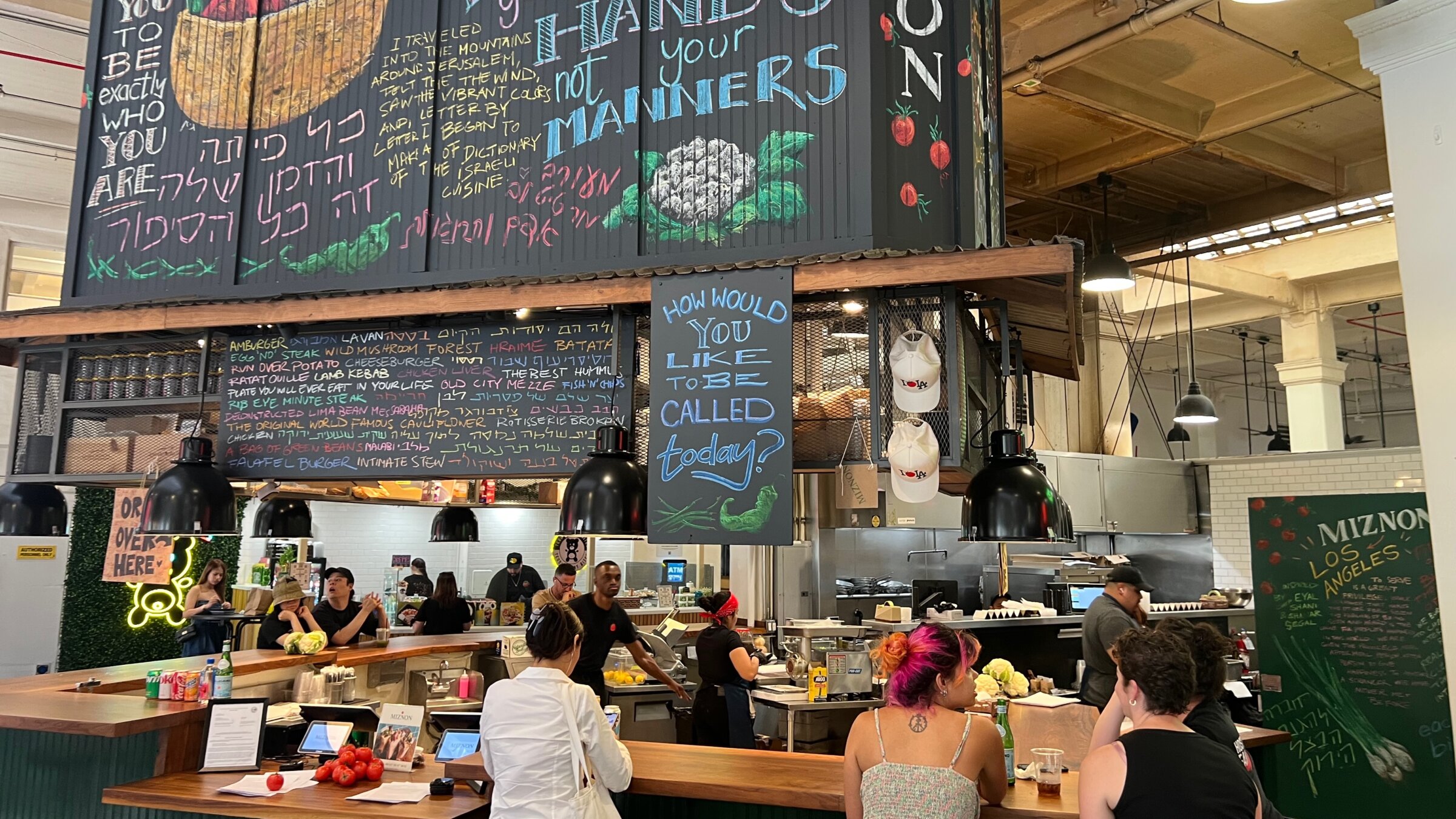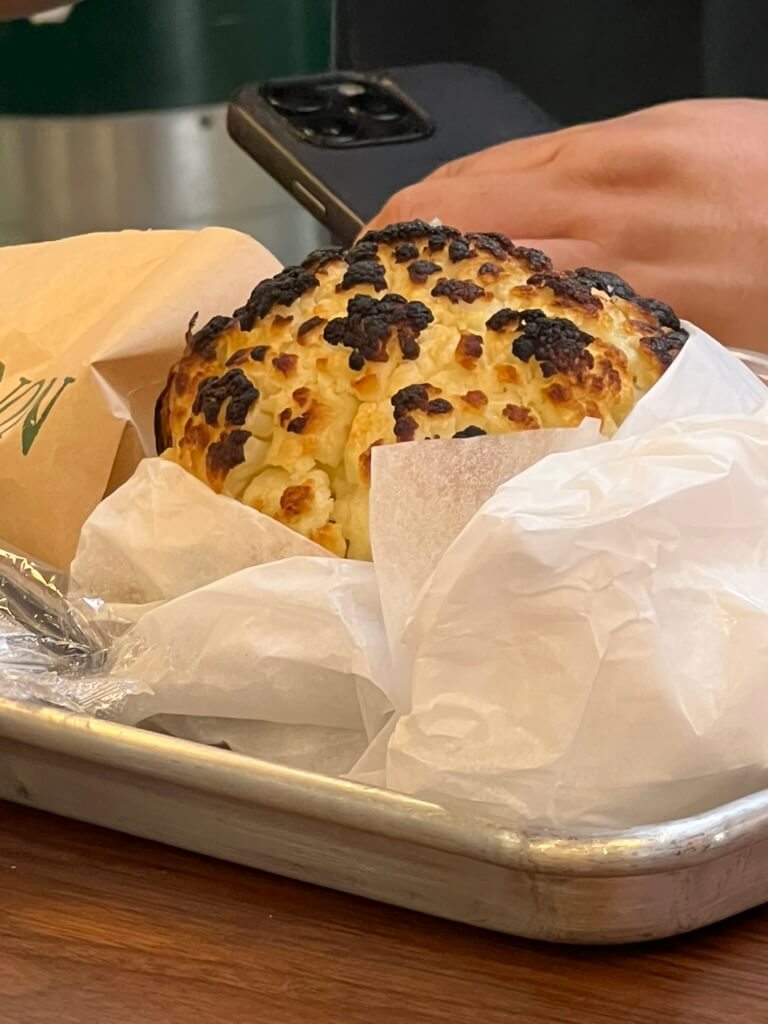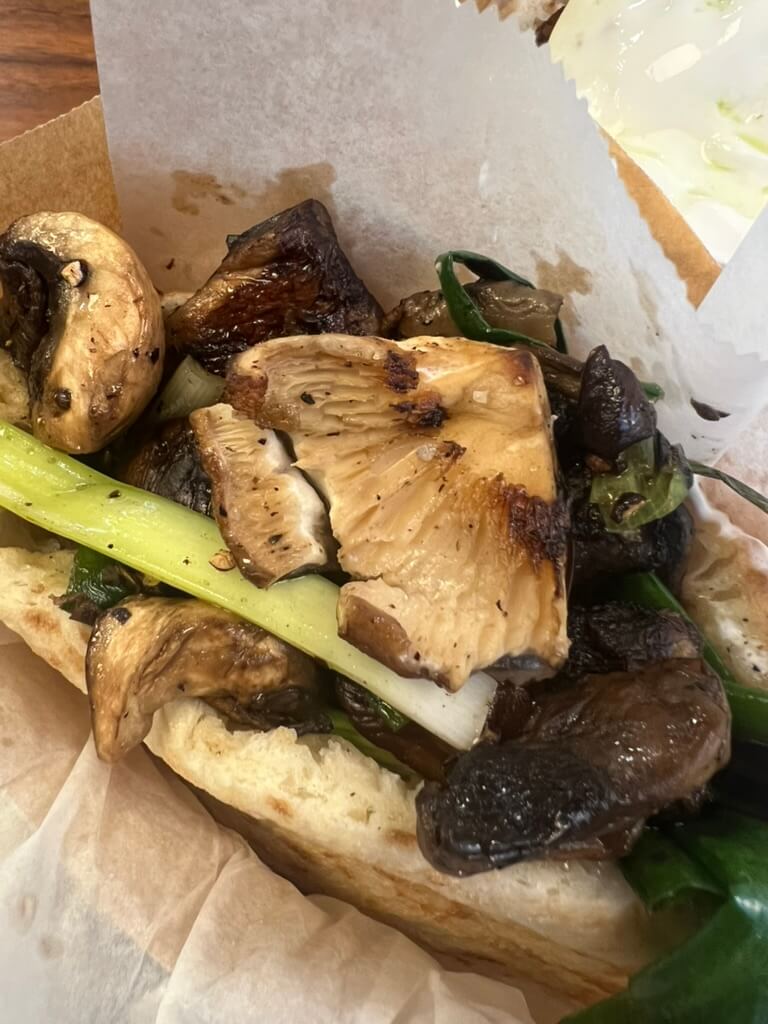‘Israel is seen as violent’ — and Israeli chefs, once global culinary icons, are feeling the heat
How Eyal Shani is navigating war — while his business partner speaks on behalf of a controversial aid effort

Israeli chef Eyal Shani’s Miznon restaurant opened in Los Angeles’s Grand Central Market in June 2025. Photo by Rob Eshman
It used to be that three kinds of people frequented the Israeli chef Eyal Shani’s international restaurants — Israelis, diaspora Jews, and everyone else.
But when “the Israelis and the Jews were away for Passover” this spring, Shani said, “all the others, they didn’t want to go.”
Shani’s high-energy eateries — 12 in Israel, and 30 around the world, including Port Sa’id and Malka in New York City, and offshoots of the Tel Aviv-based Miznon across the U.S. — have long attracted droves of customers and critical raves with pulsing Israeli music and earthy, original transformations of Middle Eastern ingredients. But Shani — who earned his first Michelin star for Shmoné, also in New York, in 2023 — understands why some people are staying away.
“Israel is seen as violent,” he said, matter-of-factly. “It’s not cool anymore, and we can feel it.”
‘A violent time’
I visited Miznon in downtown Los Angeles’s Grand Central Market — Shani’s first outpost in L.A. — on day 11 of Israel’s war with Iran. The news had just announced that Palestinians had been killed near aid distribution points in Gaza, and I wondered for an instant if my Wild Mushroom In-a-Pita (“A whole forest burned on a hot steel; scallions, sour cream and spicy”) would come with a side of protest.

The bright hand-lettered signage surrounding the oversized kiosk-style restaurant — really a kitchen encircled by a counter — was in English and Hebrew. Israeli music blared across the food court. But while business was indeed slow, a server told me, they thought it was because President Donald Trump’s administration’s campaign against Latino immigrants had scared away workers and customers, and depressed all of downtown.
Shani had some personal reasons to worry about protests, beyond the broad cultural turn against Israel. (“It’s a violent time,” he said, during a Zoom call from his home in Haifa.)
His business partner, Shahar Segal, recently became a spokesman for the Gaza Humanitarian Foundation, the less-than-transparent arrangement funded by the Israeli government, with some U.S. backing, delivering food aid to Gaza.
“He didn’t tell me that in advance,” Shani said of his longtime friend and business partner. Shani, who hadn’t yet spoken about Segal’s involvement with the GHF publicly, told me he first heard of it when journalists called him for comment.
“I called Shahar, and I told him, what would you like me to do with that information? He said to me, leave it. So I left it.”
But while the GHF has come under fire, Shani said he trusts Segal’s motives for getting involved.
“The only thing he wants is to improve the world,” he said.
Learning from the women of East Jerusalem
Shani, who is 66, was born and raised in Jerusalem. His mother’s family goes back eight generations in the city. His father’s family immigrated from Moldavia.
He opened his first restaurant, Oceanus, in Jerusalem in 1989, at the age of 27. When I ate there one evening in the early ’90s, the waiter plopped a warm, wheel-sized focaccia on the table, and a bowl of sharp local olive oil. I was stunned. In a country where fine dining meant mediocre Continental hotel food, Oceanus was a revelation.
Over Zoom, I asked Shani what inspired him.
“I looked at the old women inside the walls of the Old City of Jerusalem,” he said, of the Palestinian women who sell baskets of produce in East Jerusalem. “I tried to find my way with their cucumbers, tomatoes and olive oil. The Israelis didn’t know what lamb is, the Arabs knew it. And I took inspiration from the Arabs, from the Old City of Jerusalem, from the mountains around Jerusalem.”
“Each thing that I discovered, I thought that I invented, even though many people, millions in the world, did it in the past.”
The idea that food shouldn’t, or couldn’t, cross cultures — the ever-ready charge of “cultural appropriation” — doesn’t faze Shani.

If people don’t use traditional foods they disappear, he said. His gift, he realized, was his ability to transform them, create something new out of traditional foods.
“I understood that I could match ingredients together, and invent something,” he said. “That gave me confidence. So when I’m talking about Israeli food, I’m talking about my food. I’m like the godfather of Israeli food, but there are now brilliant young chefs. ”
The magic of the moment
At the Miznon lunch counter, I saw that confidence pay off. Gradually, the seats filled. Customers mostly ordered Shani’s sandwich creations: cauliflower topped with tahini, tomato salsa and spicy green peppers; a “folded cheeseburger”; or “Rotisserie Broken Chicken with tahini, za’atar, spicy green peppers, scallions,” all stuffed in thoughtful layers of flavor into warm, soft fresh pita.
Controversy? Protest? The diners, enjoying their plump sandwiches, seemed oblivious to all.
“The pita is at the heart, connected to the head,” Shani said, when I described the scene. “The brain and the heart, one circle.”
I said I was struck by the thought that the people at the restaurant appeared deeply comforted. Shani’s food appeared to ground them in the moment. It might have been born out of the conflict, but it somehow transported diners far from it.
“Tomorrow is very foggy,” he said. “The past, maybe they prefer not to remember.”
“Everything has to be now, because maybe now it’s the last meal,” he said — a mantra that has always held prominence in Israel. “So it has to be the best.”
















